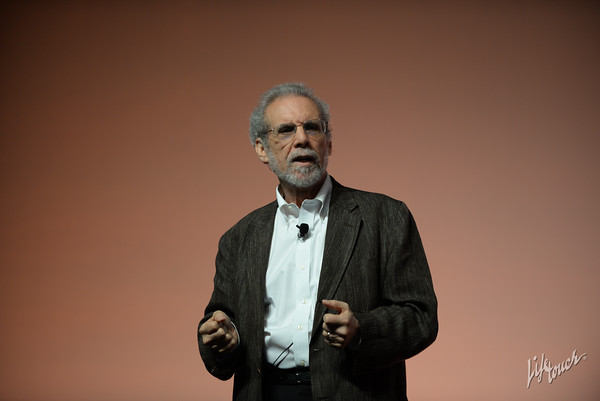The Power of Emotional Intelligence
In his NAESP conference keynote, psychologist Daniel Goleman explored FAQs about emotional intelligence, including how it impacts school climate.
By Mary Kay Sommers
Communicator
July 2016, Volume 39, Issue 11

There’s an often ignored, yet critically important, trait for leadership and success in life: emotional intelligence.
At #NAESP16, internationally renowned psychologist Daniel Goleman presented a compelling keynote about the significant impact of emotional intelligence (EI) in education. EI, he pointed out, is more than two and half times more important than cognitive competency in determining life success. Therefore, principals have a powerful responsibility to develop a school atmosphere in which every teacher and student can achieve at high levels.
Here are some of the key questions on EI that Goleman addressed in his presentation.

Session Title: Leadership: The Power of Emotional Intelligence
Speaker: Daniel Goleman
Key Takeaway: It’s up to principals to cultivate a school environment that supports emotional well-being. Hire teachers with high emotional intelligence.
Why does EI have such an impact on learners’ development?
Our ability to handle our emotions determines how effectively we think, learn, and respond in various situations. Goleman described the negative impact that lack of EI can have. For instance, a teacher who acts without EI—by not respecting, not listening, or unfairly criticizing students—can cause students to feel emotionally “hijacked” without any recourse. When a student or teacher feels this way in a classroom or school, they won’t be able to relax and focus on learning.
What key strategies can leaders use to ensure teachers and students are in the most productive state of EI?
Principals should provide teachers with and help teachers give students:
- Uninterrupted time to focus on goals.
- Explicit goals of what they need to do.
- Autonomy to achieve goals in their own way.
- Immediate feedback on how they are doing.
- Goals that are matched to one’s skill set.
Principals and teachers should also know and demonstrate quick calming exercises, such as closing one’s eyes, sitting up straight, and focusing on breathing. Younger children can play the “belly buddies” game, in which they place a stuffed toy on their bellies. The goal is to return the toy’s movement to a normal breathing pace.
What can principals to be more effective during instructional coaching with teachers?
Principals should be aware of their verbal and nonverbal communication during coaching sessions. Research shows that if teachers are feeling positive and emotionally supported at the time a principal shares constructive feedback, the teacher will more likely use the feedback for growth.
How can we create a positive rapport with anyone?
- Be fully attentive in conversations. (That means not texting or thinking about something else.)
- Be aware of the key triggers that result from our verbal and nonverbal responses.
- Create an environment in which it just feels good to be with that person.
What if a principal unknowingly sets off someone’s emotional triggers?
Research shows that if a principal creates a negative emotional mood, teachers will absorb it, which will likely negatively impact their performance. This “hijacked” feeling can then be transmitted to students.
It’s the critical responsibility of leaders to hire staff members with strong EI, said Goleman, and to lead with this skill. Principals should model and help others maintain this mindful approach for effective teaching. An attendee in Goleman’s session reflected on how, to identify the best teachers during hiring, this interview question always works: “Is it important to have a relationship with your students? Explain.”
“Now I know why these teachers became superstars,” said the attendee.
How do we improve our own EI?
Goleman’s competency framework identifies learnable skills principals should master. With these skills, principals can prevent emotional hijacks, inspire others to lead, influence different ways of thinking, manage conflicts to avoid negative impacts, and build collaborative teams.
Start by identifying one area to improve, and practice in various situations, even at home, until it becomes a habit. The steps to mastery are:
- Self Awareness: Know what we feel in the moment and use that to guide us.
- Self Management: Identify our strengths and growth areas as we impact others verbally and non-verbally.
- Social Awareness: Develop rapport and empathy skills.
- Social Skills: Reading and handling our emotions to serve as effective leaders.
Does EI really impact our leadership style, student and adult performance, and school culture?
Goleman’s research identified how different leadership styles impact teachers and school climate.
- Positive and visionary leaders with effective coaching skills (high EI) had the highest impacts on school climate.
- Principals who have fun with staff and use a democratic or consensus model have good impacts on school climate.
- Leaders described as pacesetters who push others to do even more, deliver commands, or demand compliance have low impact on their schools.
Ultimately, Goleman’s insights can lead principals forward in the direction that will ensure all educators and children will be successful.
Mary Kay Sommers is an educational consultant in the Fort Collins, Colorado area.
—
Copyright © 2016. National Association of Elementary School Principals. No part of the articles in NAESP magazines, newsletters, or website may be reproduced in any medium without the permission of the National Association of Elementary School Principals. For more information, view NAESP’s reprint policy.

